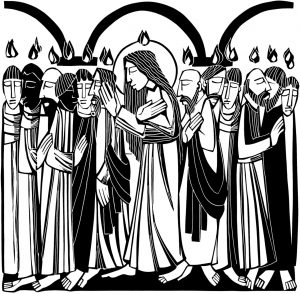What is the native language of your faith?
When the Holy Spirit comes to bless those followers of Jesus gathered in Jerusalem over two thousand years ago on the Jewish day of Pentecost, a miracle occurs. Tongues of fire appear among the people, and a tongue rests on each of them. They are filled with the Holy Spirit, and begin to speak in other languages, through the help of the Spirit. As this cacophony of speech rises up, the international crowd who is gathered in Jerusalem hears the believers speaking about God’s deeds of power in their own native language. It’s as if the new church is speaking directly to each of them, in a way that they can understand.
Many of us here at West Concord Union Church have the same first spoken language: English. There’s not the same clear majority when it comes to our native liturgical language. We have among us in this congregation folks hailing from a wide range of protestant denominations: Congregationalists, Lutherans, Episcopalians, Methodists, Presbyterians, Baptists, and Unitarian Universalists. Also here are folks from Catholic tradition, and those with a Jewish upbringing. Also among us are more and more folks who were raised without a faith tradition.
We gather together: with different sacred hymns, different practices of baptism and communion and prayer, different expectations of sermon length and content. And we have other differences, too: a preference for silence, or for boisterous joy. A devotion to classical music, or to folk or rock or jazz or hip-hop. A need to move our bodies, or a desire to be still. A longing to connect with other people, or a preference for our own personal prayer space. An affinity for some names and images of God, and a discomfort with others.
We are so liturgically different. And yet, we find ourselves together. We are all here together, and having come together, we realize how blessed we are by one another. So the question arises: how shall we worship?
A few years ago, I read a piece from a pastor whose name I can’t find, who followed what they called “The 70% rule.” Many of you have heard this story. According to the 70% rule, if more than 70% of any worship service is something any of us would have picked ourselves – there is a problem. That means that the service is probably not doing a great job of serving anyone else: people with different liturgical languages than ours.
So maybe the goal shouldn’t be 100% satisfaction with our worship services. We want to leave some room for others. On the other hand, we want to make sure that each of us gets a chance to hear a liturgical language that speaks to us some of the time. We arrive at church tired from our own personal struggles. We arrive at church tired from living in this broken world. We arrive at church tired, and so thirsty for living water, for hope, for love, to come to us in a way that we can receive it.
So, to that end… I invite you to take a few minutes now to consider the questions on the handout in your bulletin. What makes you feel at home in worship? What has been new to you here that you’ve learned to appreciate? What favorite hymns/pieces of music/prayers/practices of worship do you cherish? Please record anything you feel moved to share…
Thank you. I hope you’ll put this in the offering plate when it comes around, so we can learn more about one another’s liturgical languages. I invite you now to take a look at the bulletin cover. There you’ll see an image of the believers on the day of Pentecost, each with a tongue of flame over their head. It’s an amazing story, an amazing image. Now, take a look at the beautiful children of God who have joined together with you this morning for worship. Imagine, if you can, that each of us has a small, brilliant tongue of flame hovering above our heads – just high enough and small enough that you’re not worried that anything is going to catch fire. If you see a flame above each head, that’s 70, 80, 90 flames filling the room.
That’s a lot of flames – a lot of human spirits – a lot of heart languages. Each one, different. Each one, true. Each one, beautiful. Each one, a response to the movement of the Great Spirit who moves in us all.
Holy Spirit, speak to my heart in a way that I can understand: help me to feel your presence and your power. Holy Spirit, speak to the hearts of all those who surround me. May they, too, be filled with your presence and your power. This world is in such great need of the fire of your love. May the brightness of your flame in each person here, and across the earth, give warmth and encouragement to my own, guiding and fueling the mission you give to us all. Amen.
